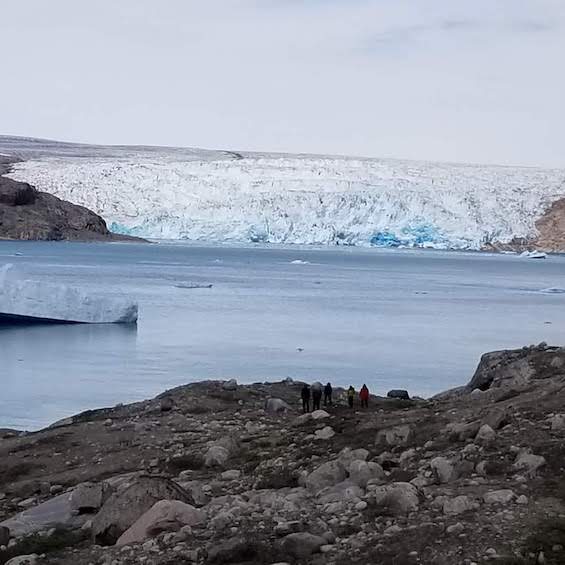
Faculty from the University of Southern Maine’s Muskie School – Geography-Anthropology program, the School of Social Work and the Department of Art led students on an interdisciplinary, boundary-spanning, research field trip to south Greenland during the summer of 2022. The field trip was a culmination of a two year project, “Maine-Greenland Collaborations,” supported by the Maine Economic Improvement Fund.
Over the past two years, the project has explored the environmental, socio-economic and cultural changes and challenges facing small coastal communities in south Greenland and our home state of Maine. The project engaged faculty and students in research and creative practices that focused on understanding human-environment interactions and the impacts of ecological change on people and the landscape. Students were trained in convergent approaches, drawing upon knowledge and methods from the fields of geography, Geographic Information Systems, art, and social work. Students learned to use and analyze satellite data to measure landscape change, employ social science and social work methods of data collection and analysis, and study how digital media and photography could be used to record the stories of communities both near and far.
The group visited several communities, both small and large, in south Greenland and many of which were contained within the boundaries of the UNESCO World Heritage site of Kujataa. At each community, the group observed changes with local guides and learned about historical and current conditions. The group engaged in field verification of satellite image data, both digitally and through artistic means, and they recorded landscape features as different places were visited. They compared and cross-referenced archival maps and images with current landscape features and interviewed farmers and community members about changes to their livelihoods. And, they conducted an arts-based collage workshop at the Qaqortoq Museum, engaging locals in story-telling. The group members expressed that one of the most rewarding parts of the journey was staying in the homes of local farmers and eating with their families, while hearing from them about how their lives were increasingly influenced by changes beyond their local geographies. They were struck by the many similarities, in terms of economic development and environmental challenges, faced by small communities along the Maine coast and south Greenland communities. There were learning lessons for both the travelers and their hosts.
Students came away with a renewed sense of passion for their education. Izaak Onos, a graduate of the Muskie School’s undergraduate Geography-Anthropology and graduate Policy, Planning & Management program reflected on his experiences: “As a team, we spent a lot of time in sheep farms. We would interview the farmers. After the interviews, Dr. Firooza Pavri and I would sit with the farmers and present our vegetation analysis. For all, it was the first time they had ever seen any vegetation maps of this type of their home region. I knew that going to Greenland would ’breathe life‘ into our two-year study. However, I was not prepared to be so moved by us sharing our research with locals. Dr. Pavri and I stayed up until nearly midnight with one farming family. They were using our maps as a planning tool, looking for ways to make their farm more resilient in the future. It was an incredible moment. For the first time, I felt like my research was making a difference. It was a big realization for me. I want to use my geographic skillset and planning education to change people’s lives.”
In another instance, PhD student in Leadership Studies, Lisa Luken said “the experience of traveling to Greenland with the multidisciplinary research team was foundational in my graduate educational experience at USM. It was the most impactful experience of my academic studies, and it exceeded all classroom experiences I have had to date. Through this positive experience, I have become motivated to advocate for immersive global student experiences as I evolve in my academic career.”

